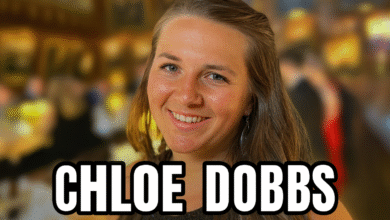Emma Runswick: A Powerful Voice for Doctors and Union Reform
Championing Transparency, Equality, and Fairness in the Medical Profession

Introduction
Emma Runswick is a name that resonates strongly in the medical and trade union landscape of the United Kingdom. Known for her dynamic leadership within the British Medical Association (BMA), she has built a reputation as a fearless advocate for doctors’ rights, workplace transparency, and grassroots union activism. Her journey from a council estate upbringing in Wirral to becoming Deputy Chair of the BMA Council illustrates both her personal determination and her belief in collective strength.
Her life and career reflect a blend of positive accomplishments and the challenges that accompany bold reform. While many celebrate her as a reformer with the courage to challenge existing structures, others find her outspoken style confronting. Yet, it is precisely this mix of courage and persistence that has defined her legacy in both medicine and trade unionism.
Quick Bio
| Category | Details |
|---|---|
| Full Name | Dr. Emma Runswick |
| Nationality | British |
| Birthplace | Wirral, England |
| Education | University of Manchester, Medicine |
| Current Role | Deputy Chair, BMA Council (2022–2026) |
| Medical Career | Resident doctor in community mental health, Greater Manchester |
| Key Focus | Transparency, grassroots organizing, pay restoration |
| Activism | Member of Broad Left, advocate for democratic reform |
Early Life and Family Background
Emma Runswick grew up in Wirral, England, in a working-class family deeply rooted in union traditions. Her father, Alan, was an active figure in the Public and Commercial Services Union, serving in roles of responsibility for decades. Her mother, Kathy, was also involved in the Labour movement, giving Emma a household that valued fairness, community, and activism.
This environment instilled in her the principles of solidarity and collective responsibility from an early age. Rather than being drawn solely to personal achievement, Emma learned the importance of advocating for broader communities. This unionist upbringing later influenced her approach to both medicine and her leadership within professional organizations.
Education and Student Leadership
Emma studied medicine at the University of Manchester, where her commitment to activism became evident. As a student, she took part in medical union activities, serving on the BMA Medical Students’ Committee and later chairing the Medical Students’ Conference.
Her leadership at a young age demonstrated her ability to represent others, negotiate, and drive change. For Emma, education was never only about academic progress; it was about creating fairer structures for fellow students and preparing for a career that would combine clinical work with collective action.
Medical Career in Mental Health
After completing her studies, Emma pursued her medical career in mental health, working as a resident doctor in Greater Manchester. Her focus has been on community and older adult mental health, where she continues to serve patients with dedication.
In her clinical role, she is known for her compassionate approach and her understanding of the broader social determinants of health. She emphasizes the importance of accessible mental healthcare and has shown particular interest in D/deaf mental health while learning British Sign Language to improve communication with patients.
Rise in the British Medical Association
Emma’s professional journey is inseparable from her activism in the BMA. She was elected to the BMA UK Council in 2018, a platform that allowed her to represent doctors on national issues. Her contributions quickly gained recognition, and in 2022 she was elected Deputy Chair of the BMA Council.
This achievement was historic. She became the first openly LGBTQ+ person, the fifth woman, and only the second junior doctor to hold a Chief Officer role in the BMA. These milestones underscore her commitment to representation, equality, and breaking barriers in traditionally hierarchical structures.
Advocacy and Grassroots Organizing
Emma Runswick is well known for her role in pushing for pay restoration and improved conditions for junior doctors. She has consistently argued that industrial action is a necessary tool when negotiations fail to protect members’ rights. Her advocacy was crucial in mobilizing junior doctors during recent campaigns for fair pay.
She is also a central figure in the Broad Left faction within the BMA, which focuses on grassroots organizing, transparency, and democratic accountability. By addressing issues such as opaque spending and procedural imbalances, Emma has sought to make the BMA more representative of its diverse membership.
Positive and Negative Perspectives
Supporters view Emma as a courageous leader who is unafraid to challenge tradition. Her focus on fairness, inclusivity, and transparency has made her a role model for many young doctors and activists. She is praised for donating additional earnings from her BMA role to the strike fund, further proving her loyalty to collective causes.
On the other hand, critics argue that her emphasis on industrial action can be divisive. Some see her outspoken approach as confrontational, especially within the established structures of the BMA. These criticisms highlight the difficulties faced by reformers who seek to disrupt established systems.
Public Engagement and Media Presence
Emma has not limited her activism to meetings and negotiations. She frequently represents the BMA in the media, explaining the reasoning behind industrial action and pay campaigns to the wider public. She is also active on social media, where she shares updates, commentary, and encouragement to fellow doctors.
Through her public voice, Emma has become an accessible figure, ensuring that debates around healthcare and union reform are not limited to closed rooms but reach a broader audience. This openness has further solidified her position as both a leader and an advocate.
Latest Developments
In her role as Deputy Chair, Emma continues to influence key discussions around NHS working conditions, patient safety, and the future of union strategy. She has recently been part of correspondence and negotiations with NHS leadership regarding preparedness during industrial action.
Her ongoing work shows that she remains at the center of the struggle for fair pay, better working environments, and a more democratic BMA. With her term continuing until 2026, her influence is expected to shape the association’s direction for years to come.
Legacy and Impact
Emma Runswick’s legacy is already taking shape, even though her career is still developing. She has proven that representation matters, becoming a visible example of diversity within professional leadership. Her insistence on transparency has opened conversations about accountability that extend beyond medicine into broader trade unionism.
Whether viewed positively as a reformer or critically as a disruptor, her impact is undeniable. Emma has reshaped how junior doctors and activists perceive their role in influencing policy, inspiring others to take part in collective action for long-term change.
Emma Runswick stands as one of the most prominent union leaders in the medical profession today. Her story blends personal determination with a commitment to collective action. From her early life in a unionist family to her current role in the BMA, she has consistently demonstrated the power of speaking out, organizing from the ground up, and challenging inequality.
Her journey shows both the positive achievements of breaking barriers and the criticisms faced by anyone determined to reform established systems. Ultimately, her influence continues to shape the future of medical trade unionism and inspires others to join in the struggle for fairness and accountability.
Frequently Asked Questions (FAQ)
Who is Emma Runswick?
Emma Runswick is a British doctor and trade union leader, currently serving as Deputy Chair of the British Medical Association Council.
What is her area of medical work?
She works as a resident doctor in community and older adult mental health in Greater Manchester.
Why is Emma Runswick significant in the BMA?
She is the first openly LGBTQ+ Chief Officer, the fifth woman, and only the second junior doctor to hold this role.
What are her main campaigns?
She campaigns for pay restoration, workplace transparency, democratic reforms, and grassroots organizing within the BMA.
What is her legacy?
Her legacy is centered on diversity, transparency, and empowering junior doctors to actively shape union policies.



